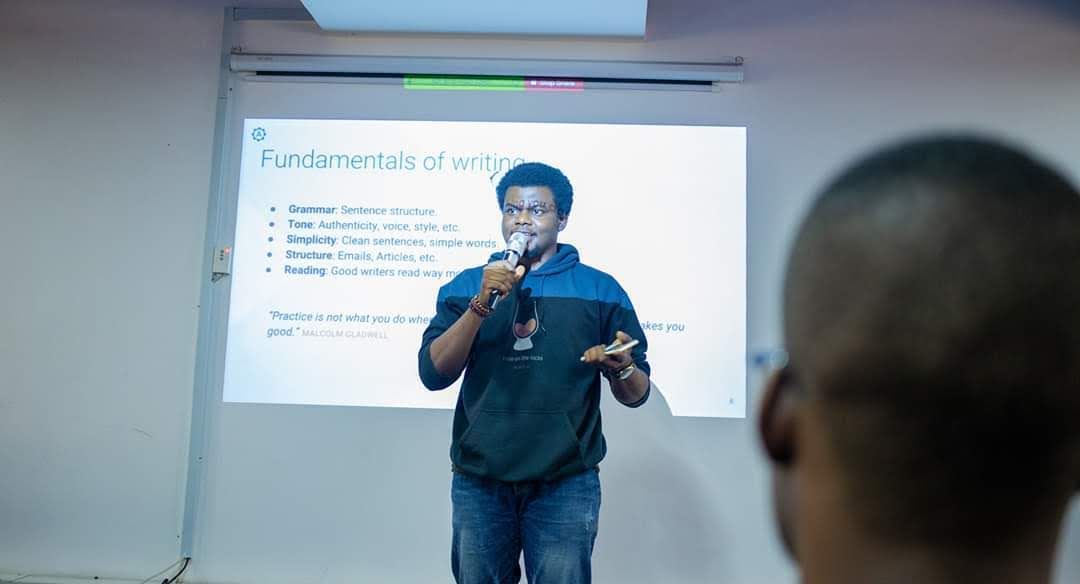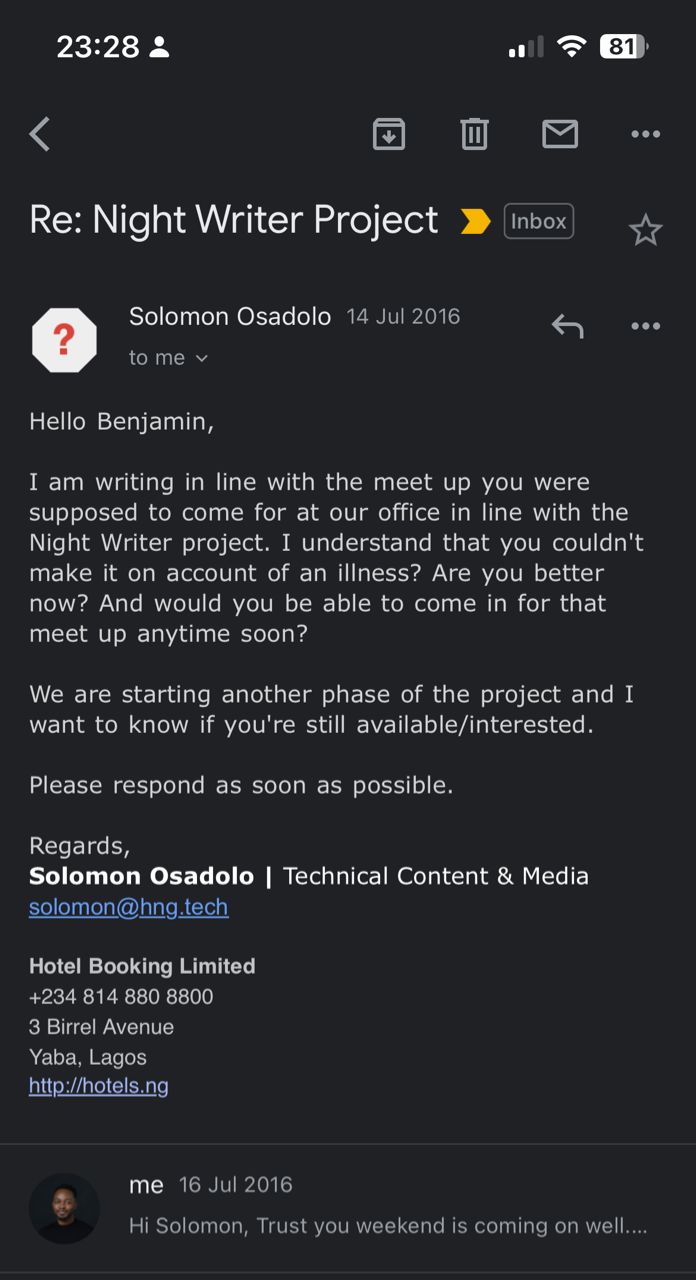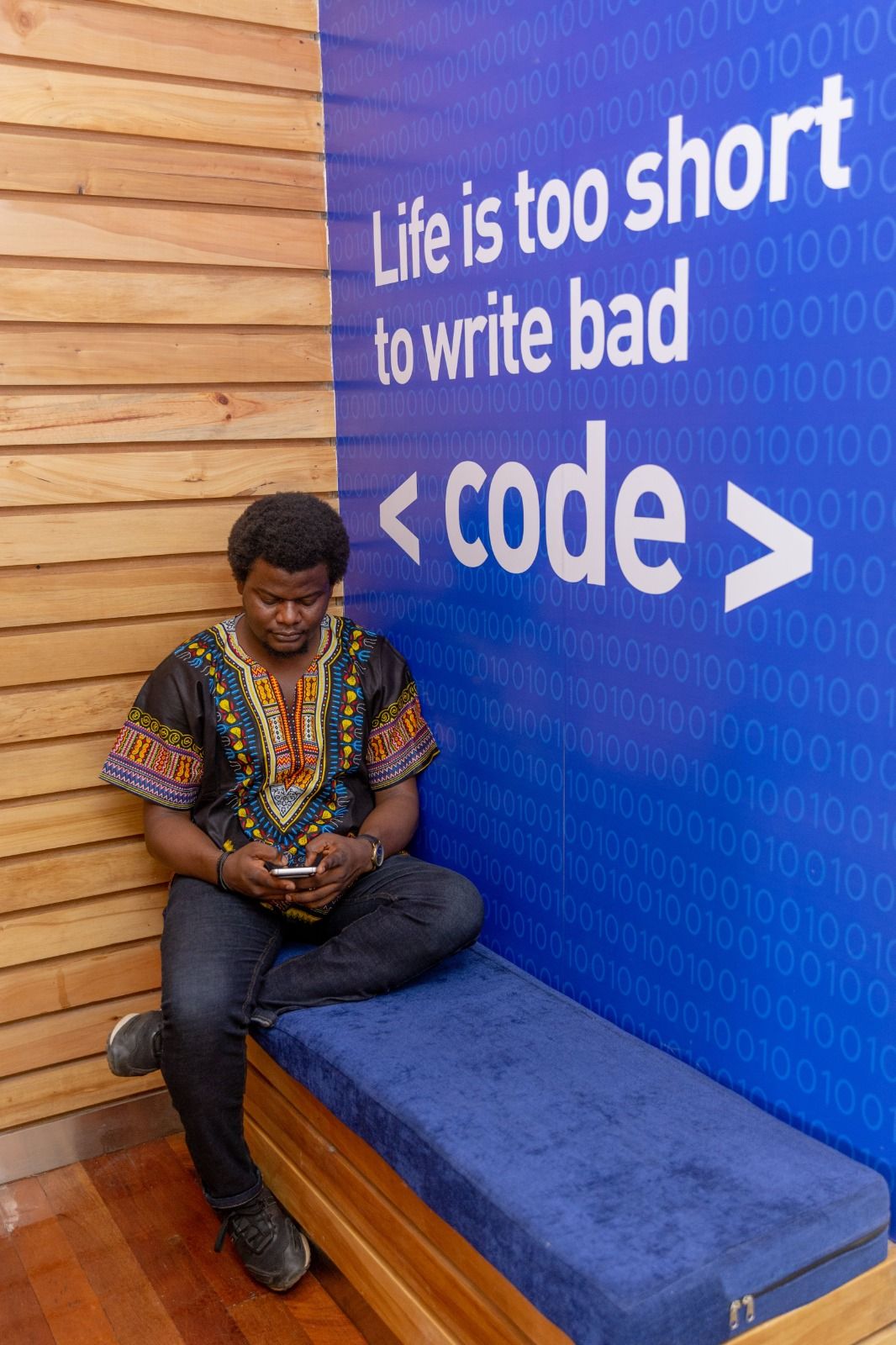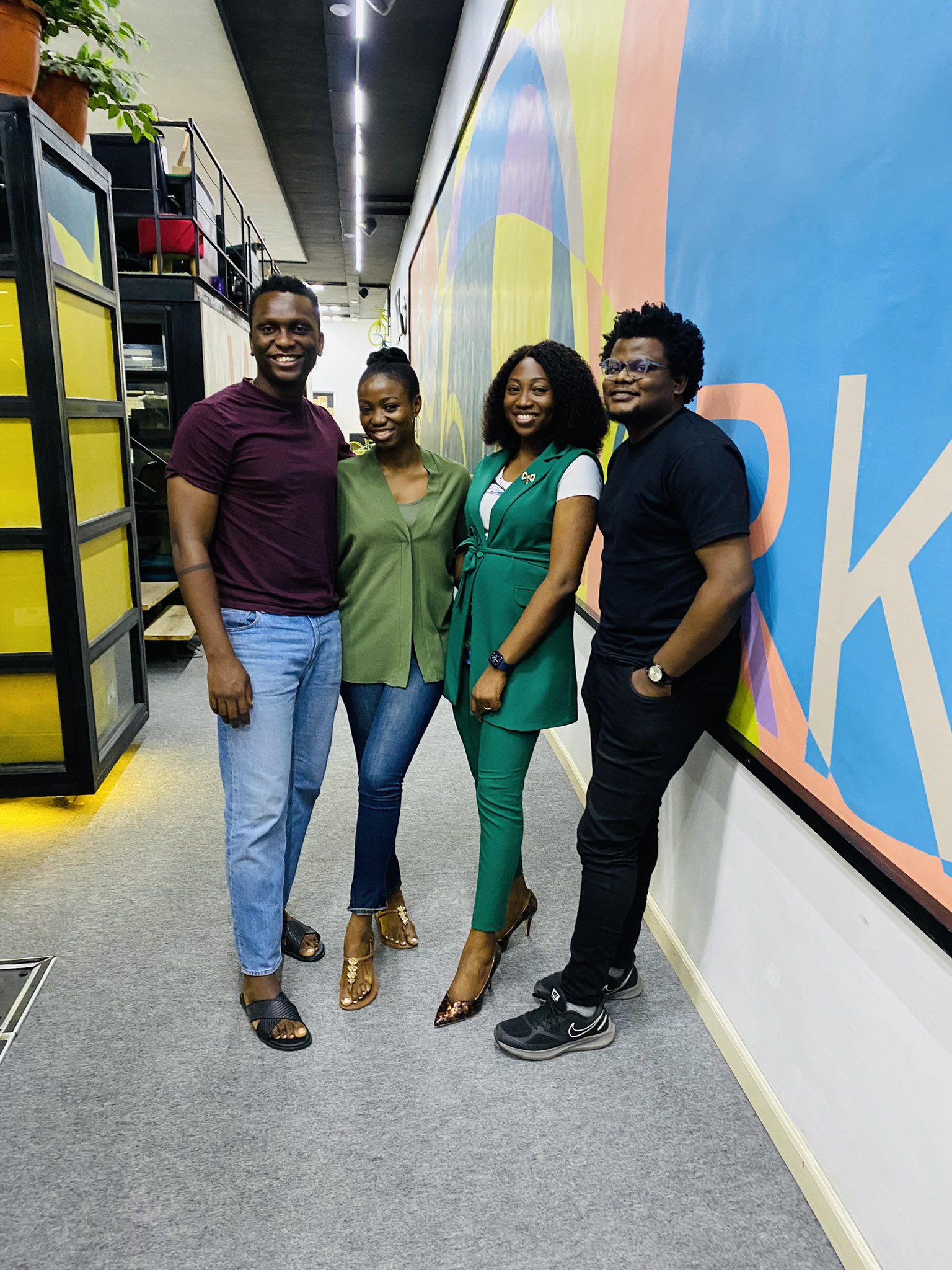My first interaction with Solomon was in July 2016 when I applied to be one of Hotels.ng’s[1] contract writers.
Then, he was the Technical Content and Media manager. He assumed the role following the promotion of Justin Irabor, formerly Head of Content, to Head of Marketing at Hotels.ng. But Solomon’s entry into tech was not as a content professional, despite having a media background. Instead, his first job at a tech company was as a Personal Assistant (PA) to CEO Mark Essien.
Speaking to Solomon inspired me as a Content person and tech talent. You are guaranteed a good time as I break down our conversation into growing up, early career, getting into tech, maximising earnings and his plans for the future.
Growing up, the art and science of Solomon
Solomon grew up in Benin, the capital of Edo State in Southern Nigeria, where he completed his primary, secondary, and tertiary education. He was raised in a family of six, with two parents and four children. Solomon is the second of four boys.
“In Benin, life was simple. My parents grew most of what we ate at their farm, which we tended to on Saturdays“, says Solomon. His routine was straightforward, school on weekdays, farm on Saturdays and church on Sundays.
His parents, civil servants who served as teachers in the state, instilled a strong reading culture in their children–through the environment they created at home.
“In my house, books were the toys,” he tells me. “My elder brother and I made a hobby of stealing our dad’s books from his ’60s collection. Then, one day he caught us and made it formal. So, occasionally, he would bring out two books and give them to us. We would each start with one and exchange them before returning them to him for a new set.”
Solomon’s book-reading journey continued beyond his dad’s collections. “I also used to take books from my school and uncle’s library until I had my collection of books in secondary school”, he says.
“Are you a nerd?” I quipped. “Sort of”, he answered. “I think I was a nerd back then, as I didn’t do what most boys my age did. For example, I wasn’t great at football, and till today, I don’t know how to ride a bicycle,” says Solomon. “I liked books more than physical activity”.
So, he spent his growing-up years reading books and watching movies. “Movies also shaped my childhood”, he tells me. “As a child, I watched Sci-Fi movies. I recall moments when I would look at the sky with my friends, try to count the stars and imagine what it’d be like to be an astronaut.”
“Astronaut?” I asked rhetorically. We both laughed in acknowledgement of how ridiculous that sounds, in retrospect, as Nigerians. While the UAE has already sent an astronaut to space, Nigeria plans to get its first astronaut into space by 2030–a “lofty ambition“, according to a specialist on Space programs, Prof. Calestous Juma, cited by CNN.
However, that’s the beauty of being a child—the ability to dream before reality sets in.
Although his dreams of becoming an astronaut were far-fetched, that gave him an inclination of what to study at the tertiary level—engineering and physics. “As I grew older, I knew I wanted to do something in engineering and physics“, he tells me.
By the fourth year of a six-year secondary school education in Nigeria, you are made to choose a track; Science, Art or Commercial. This track determines the school-leaving exams you write in your final year of secondary school.
The biggest problem of my life is that I’m interested in many things. Today, I’m an artist but also a scientist.
—Solomon Osadolo
“I liked subjects like Literature-in-English & Government, and even in SS1, I still took them. But by SS2, my school was forcing me not to take them because I wouldn’t be allowed to take them in the (school-leaving) exams”, says Solomon.
So, we have a youngster who has breathed art & literature but is also interested in STEM.
This perceived paradox is why I termed this section; the art and science of Solomon. “I think that’s been the biggest problem of my life because I am interested in many things. Today, I can say that I’m an artist and a scientist. I’ve done these things and excelled, but I had to let some things go”, says Solomon.
Ultimately, he opted to study engineering at the University of Benin (Uniben), a public university in Benin City, where he grew up. “I chose engineering because the notion of unravelling the world and building things was exciting to me.”
He didn’t immediately get accepted to study Electrical and Electronics Engineering, so he studied Physics for two years at the University and transferred to Engineering. He graduated in 2011 and moved to Ebonyi State, miles away from home eastward, for NYSC[2].
Surprisingly, he didn’t enjoy working in engineering.
Early career: Solomon, the Engineering OAP
Solomon was posted to Ebonyi State for his one-year mandatory NYSC. There, he worked as an on-air personality (OAP) at the Ebonyi State Broadcasting Corporation, presenting a show called “Tech Reports” chronicling the latest trends in technology and its impact on Nigeria. Simultaneously, he took on freelance writing roles at companies like The Scoop NG and YNaija!

He finished his NYSC programme in 2013 and moved to Port Harcourt City in Rivers State[3] to start a new on-air show at Garden City Radio 89.9fm.
“I was so excited. I didn’t even care about the money. What made it more exciting was that the show was growing in popularity in Port Harcourt”, he says.
While in Port Harcourt, Solomon applied for a job at an Oil and gas firm as a Sand Control Engineer. Finally, he was going to use his engineering degree. But it wasn’t as enjoyable as he had hoped, worsened by the fact that the pay from this company was “abysmal”, in Solomon’s words.
“I didn’t enjoy it at all. It was one of the most horrible moments of my life, to be honest…it was like I was stuck in a dead-end job”, he says. “As it’s commonplace, any job that’s not great takes the most of your time. Such that you don’t have the bandwidth to do anything else”, Solomon tells me. I find that profound. In local Nigerian parlance (pidgin English), you can read that as “person (in this case, company) wey go help you no go stress you”. We both broke into a laugh.
Any job that’s not great takes most of your time. So, you don’t have the bandwidth to do anything else (like find a new one).
(Un)fortunately, in 2014/15, crude oil’s price tanked globally, leading to mass lay-offs in Nigeria’s oil-exporting economy. “My company was downsizing, and they shut down my entire department. Although I was losing a job, I felt relieved about reclaiming my time”, says Solomon.
In that time, he reached out to his friends to let them know he was open to new opportunities. Unsurprisingly, many of his friends were at other oil and gas firms, but after waiting for a rebound to no avail, Solomon, the career nomad, left the city of oil for the country’s economic hub, Lagos State.
“That [downtime] was when I started thinking more actively about tech because it was just taking off in Nigeria”, says Solomon.
Getting into tech, from PA to Content Manager
“I came into tech as a PA”, Solomon tells me. “My friend from NYSC, AY (Ayodeji Akanji), who was now working at Hotels.ng, sent me a tweet from his CEO (Mark) about needing an intern. I replied and sent him a DM (Direct Message on Twitter)…I got the job”.
@markessien I am interested.
— Solomon Osàdòló (@Soloxpress) August 28, 2015
AY’s path was different. After NYSC, he went for a Master’s in the UK; once he returned, he went to work at Hotels.ng.
On getting into Hotels.ng, Justin Irabor was Head of Content. While as a PA, Solomon started collaborating with him to handle content at the company drawing on his previous experience as an online freelance content writer.
So, when Justin moved up to become the Head of Marketing, Solomon completed his transition away from an executive assistant into the Head of Content at Hotels.ng in 2016.
One of the critical projects Solomon handled was confirming hotel stays that emanated from their platform, without which his company couldn’t earn its commission. It was a very manual process that involved calling previous guests and passing on evidence to the finance team with which they could engage the Hotels. Solving this two-year collections backlog problem helped increase Hotels. ng’s revenue significantly. So, they promoted him, and his financial status began to improve.
He led other content-heavy projects, like writing tourist content on the Hotels.ng blog to attract travellers who use Google Search to find where to stay. At this point, our paths crossed because I wanted to be one of those content creators.

Working at Hotels.ng helped Solomon build a network and get “street credibility” amongst startups and tech companies, mainly in Yaba. It was the launchpad of his tech career.
After Hotels.ng, Solomon worked at Anakle and became Editor-in-Chief at ForLoop, where he published a widely-read dev-focused newsletter called ForLoop Weekly before moving on to Andela. In 2020, he joined Flutterwave, and by 2021, he became the Content Design Manager.
Solomon on how to maximise one’s earning potential
Looking at his progression so far, I asked Solomon why he didn’t decide to focus on media, and he said quite frankly that “there is not enough money in media and journalism in Nigeria. I didn’t want to be someone with so much promise who couldn’t make money, and tech seemed like the place where I could deploy the same skillset and be profitable. I think that many of the ills in today’s journalism are driven by hunger, so people cannot maintain editorial and creative integrity over their work.”
That’s true, coming from me, who has run a media platform for over five years and pays the salaries of at least five people monthly. Suppose you think content marketing professionals (aka those working on the industry side of online content creation) are underpaid. Then, you can safely assume that many journalists are doing free work.
I didn’t want to be someone with so much promise who couldn’t make money.
— Solomon Osadolo
“Working in tech made me feel at the forefront of something new. The big media houses are legacy driven. But, he concludes, “Tech simply had the better opportunities for me and more autonomy”.
I follow up this train of thought by asking him where he sees the most lucrative opportunity in content. He says, “I think content is a spectrum—with the marketing and product ends. What matters is the platform and the thing you are writing about. So I urge people to focus on what they can control: being good at their craft and then find the right platforms (aka organizations).”

Although he has been a content professional for about a decade, he didn’t become popular until 2018 when he wrote the ForLoop Weekly and was a Senior Content Marketing Coordinator at Andela. “I’ve always been a talented content professional, but those two platforms were what mattered more”, Solomon tells me to buttress the point about honing one’s craft and jumping on the right opportunity to showcase it to more people.
After doing content on the marketing side, Solomon wanted to move to the product side. Thereby completing his mental model of what it means to be a rounded content professional.
“When I left Andela in July 2020, I knew I didn’t want to do Content Marketing anymore. So, I was acquiring skills in UX writing and product management. I figured I needed to move to a product-led company, so I could use my skills to grow that product. But there were no available roles in UX writing,” says Solomon.
That’s expected but not recommended. It’s expected because many startups are trained to be lean by default. And because they are not clued in on the worth of a UX writer, that’s one of the roles that doesn’t get recruited. Instead, they add the task of UX writing to the job of a Product Designer. Little wonder that many products have a poor copy and overall user experience. Solomon would have his work cut out to convince a startup to hire a UX writer and talk less of a Content Designer.
What does it mean to be a UX writer or Content Designer?
“A UX writer primarily builds product experiences with words or language. They’re always thinking about the experience for the customer. Copy (aka text) is the last thing. Things like the user’s journey, intuitiveness of the flows and screens, helpfulness of error messages, and user testing are top of mind for the UX writer.” says Solomon.
“Content Design is a Product Design discipline, but you design with words instead of pixels and shapes. I managed to convince Flutterwave about the importance of this role, and I was brought in to do it. Thanks to GB and Flutterwave for being open to experimenting with an unfamiliar role. We were able to do some amazing work.”

The industry is bound to copy the steps of its market leader. Over time, many more startups began to hire UX writers. Flutterwave hired more UX writers who reported to Solomon.
His former direct report, Oluwamayowa Adeyemi, has leveraged her role at Flutterwave to get a new job with a Norway-based company doing UX writing.
This is one of Solomon’s proud achievements. “I can say that we made a dent in the industry”, he says. But not his only achievement.
His other achievements include writing the ForLoop Weekly newsletter that got many people into tech and development but also brought direct opportunities his way. He wrote about his entire ForLoop journey on its one-year anniversary. Also, he is proud of contributing to improving how Flutterwave builds products. “One of the last things we shipped before I left was a new Product Support page – which is a lot more intuitive, interactive and creates feedback loops.”
Perhaps, more importantly, the climax of this post is him, as an African, getting into a global tech company doing Content Design. “It’s more common to hear that a Nigerian got a job as a Developer but less so as a Content Designer. I’m probably the first content designer from Nigeria that I know to get a job in an international big tech company.”
That is true in my experience. I’ve seen a few Nigerians like Aisha Owolabi get international Content Marketing gigs from as far back as September 2020. But I’m yet to see Content Designers from Nigeria on the global scene.
After such a storied career, what’s next for Solomon?
Solomon’s plans and closing thoughts
In February 2023, Solomon joined the fintech organisation at HubSpot and is currently working on the billing experience for customers.
“HubSpot is a kind of company I can stay at and grow for a long time,” he says. For context, Solomon was at Flutterwave for almost three years and Andela; for over two years.
Regarding work, Solomon has a philosophy of only doing things that are “challenging, meaningful and profitable”. HubSpot, like his former employers, ticks those boxes. “I would not get bored for a long time to come, as the opportunities to do challenging and exciting work abound”, he adds.
He believes people should always continue to improve themselves no matter where they get in life. “I’m still growing”, says Solomon.
Solomon is taking an MBA[4], which could help unlock a future part of his career, including entrepreneurship.
In the future, he will likely build his own company or run another person’s company. “I imagine I’ll go on to build my own company at some point or run some other company”, he tells me as we conclude our conversation.
You can connect with Solomon on Twitter or LinkedIn.
1. Hotels.ng was one of the earliest and hottest startups in Yaba, Lagos. The company was founded by Mark Essien and incorporated in March 2013. Two years after their launch, in 2015, they closed a $1.2 million round from Omidyar Network, an international investment firm and EchoVC, a Lagos-based early-stage VC firm. Hotels.ng was a sought-after place to work for many young Nigerians due to its startup culture, swag, and congregation of popular Nigerian tech talents. I wrote extensively about Hotels.ng in January 2018.
2. NYSC is an acronym for Nigeria’s National Youth Service Corp programme. By law, a Nigerian graduate can only work full-time for an organisation in Nigeria once they have completed their NYSC. So, it is mandatory. The programme was established in 1973 to reconcile the country after the Nigerian Civil War, which was concluded three years prior. It aims to foster the “development of common ties among the youths of Nigeria and the promotion of national unity”. One of the ways it does this is by deploying graduates to other parts of the country than where they are from or studied.
3. Rivers State is a state in the South-South region of Nigeria. It’s regarded as the commercial centre of Nigeria’s Oil industry. For context, when Solomon left school in 2011, the Oil sector was responsible for 14% of Nigeria’s GDP, with companies like Shell and Chevron paying mouth-watering sums to their employees. Working in oil and gas was every parent’s dream for their engineering graduates.
4. It’s an executive MBA from Quantic School of Business and Technology, which is tailored for professionals with full-time jobs.
Get passive updates on African tech & startups
View and choose the stories to interact with on our WhatsApp Channel
Explore




